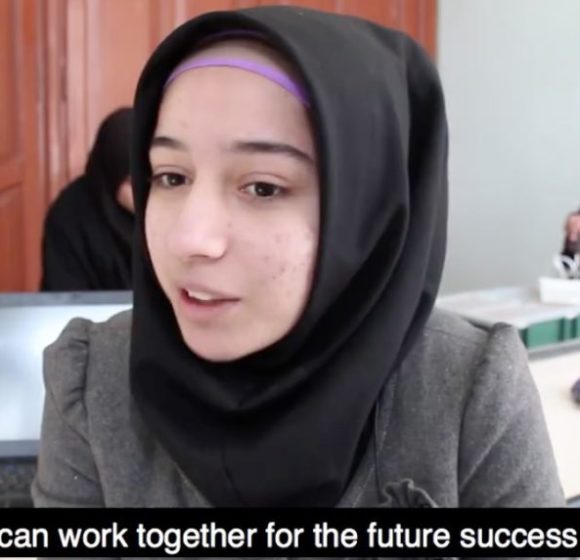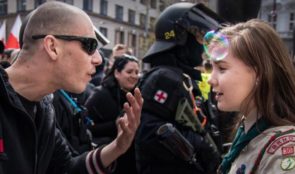“I was working at a cybercafé. The gangs started asking for the renta money and would come by my house leaving written death threats everywhere on small pieces of paper”. These are the translated words of Clara, a twenty-some year-old Salvadoran woman (Clara is not her real name). “La renta” literally means “the rent.” It refers to a gang-imposed tax that individuals and business are expected to pay. Not paying can often mean death to self or loved ones, torture, or disappearance.
Bus drivers, market vendors, hotel owners, even young school children pay “renta”.
Two young immigrant children have now died in custody of U.S. Border Patrol. In response, the Department of Homeland Security has put the blame on victims. “We are begging parents to not put themselves or their children at risk by attempting to enter illegally.” But people desperate enough to migrate would be risking their lives to stay in their home country.
“No one leaves home unless home is the mouth of a shark” is the oft-quoted line by Somalese poet Warsan Shire. El Salvador, like Honduras and Guatemala, is like the mouth of a shark for thousands of people like Clara. Salvadorans, Guatemalans and Hondurans are risking their lives to save their lives.
I am a psychologist, born and raised in El Salvador, educated in the United States. I am no stranger to the traumatic circumstances giving the country the title of most dangerous country in the world outside of a war zone. I lost a father and a grandfather to the country’s decades long violence. It is difficult, if not impossible to find a Salvadoran who has not experienced traumatic loss due to violence.
I met Clara in November through the NGO Glasswing International, a Salvadoran based violence prevention organization that helps young women and youth who are deported back from the US. At least three flights arrive weekly with deportees, mostly young adults thirty and under. Buses arrive daily from Mexico. They all arrive in La Chacra, the mandatory government gathering point for all deported Salvadorans and other foreigners who have been caught trying to make it to the US without documents.
Clara’s life is not unlike those of thousands of families in the migrant caravans making their way north as Trump shuts down the government over funding for a wall to keep them out.
Like Clara, most are fleeing terrifying, life-threatening violence. Most bring their children with them to avoid losing them to forced gang recruitment.
Women like Clara know there is immense danger and uncertainty in making the journey, whether through a smuggler or with a caravan. It is estimated that six out of ten Central American young women who migrate to the US via Mexico are raped along the way. Clara does not want to speak about the traumas sustained in the journey. Life back in El Salvador is hard enough. She has told me how she can’t sleep, how her sister and mother never leave their tiny house, how they block windows and doors with mattresses.
She knows of other women who’ve been disappeared, tortured or killed. El Salvador is one of the most dangerous places in the world to be a woman.
For Clara and the thousands like her, the very slim chance at an asylum application is preferable to the daily fear of being kidnapped, killed, or running out of places to hide in El Salvador. Clara does not know much about U.S. politics. In her mind, the U.S. adheres to a higher moral code for understanding human rights violations, particularly of women and children, no matter where they are from. This belief supercedes any current political tensions about immigration in U.S. soil. Her faith in the goodness of the American people is unquestioned.
Clara is part of a support group of a dozen young women, facilitated by Glasswing. Most don’t give their full names, most do not have (or provide) a local address. It’s too dangerous. They move around to escape being found by the same gangs that led them to flee. They change their phone number frequently. The social workers do not ask any personal demographical information which could make the women uncomfortable and stop attending.
The program aims to restore a sense of belonging, offer emotional support and job skills such as computer classes, and tries to get them employment. The overall goal is to keep women from attempting the journey again.
Clara’s group re-names itself the “Young Women Who Still Dare to Dream Club”, in defiance of their reality. The name is ironic, Clara points out, because in truth there isn’t much to dream for back in El Salvador. Once repatriated, they are marked with a “delinquency” record by the Salvadoran police at the mandatory checkpoint in La Chacra. Their crime is having entered another nation without proper documentation. Clara and the rest of her group will forever carry the burden of being “illegal”, not only in the U.S., but also in their own country. These women will not be easily employable, either by national or U.S. based companies like call centers, the typical fall back plan for many young Salvadorans.
The circumstances from which many Central American women seek asylum aren’t easily captured in the “credible fear interview” to which they are currently entitled. They are fleeing immediate danger, one of the criteria for asylum, but in order to qualify they must prove that they are being prosecuted due to affiliation with a certain group, race, religion, or political affiliation. Proving gang persecution when coming from a country where people fear going to the police, and where the police may be corrupt, is impossible. There is no safe way to establish a paper trail, let alone carry such documentation across international borders on foot.
Clara went to the police the first time she was threatened but was told her claim was not credible because there was police presence in the neighborhood.
When the gangs found out she had gone to the police, the threats escalated until her mother saw no option but to escape.
In June, former U.S. Attorney General Jeff Sessions stated that gang and domestic violence did not constitute grounds for political asylum. But this contradicts the spirit if not the letter of international law, based on the Universal Declaration of Human Rights, to which the U.S. is a signatory, which says people have a right to emigrate and seek protection from persecution in a country not their own. The United States was founded on the principle of freedom from persecution.
We not only have a moral obligation to welcome refugees, there is a public health argument: trauma cause lifelong consequences on health, relationships, and mortality. The evidence for gang-related violence and its impact on the Salvadoran population, particularly its youth, is overwhelming. The stress and trauma is toxic to one’s health, like a poison.
The families “invading” the U.S. border are fleeing this poison. Deporting them back perpetuates it. Toxic trauma is a silent killer, a virus that will eventually catch up with everyone in its path. It is cumulative, intractable and complex. It can take years off one’s life, it can be passed down generationally, it changes brain development, it can even change gene expression. It can change a whole culture.
Scenes of chaos at the border may frighten the average U.S. citizen, and we may feel that we’re safer to keep “them” out. But we cannot separate ourselves as a nation from the suffering of our next-door neighbors. Their circumstances are deeply entrenched in past U.S. policy in the region. This is not only a human rights issue, but a potential national security issue. Bolstering detention centers run by private prisons, separating families, threatening migrants with barbed wire, military troops, and tear gas—these actions will not deter people fleeing for their lives. It will only cause more trauma, which may lead to more violence—for us and them.
Unless we understand that it is a will to live and not reckless risk-taking that leads people like Clara out of their home countries, not much progress will be made in immigration reform within the United States. In spite of everything Clara has been through, she sees no other option than to try again to enter the U.S.
Our health as a nation—psychological, ideological—is tied to our response to the legitimate needs of immigrants. If we keep denying asylum to those fleeing toxic trauma, we only poison ourselves.
Dr. Selena Sermeño is a bilingual psychologist specializing in childhood trauma and an Encore Public Voices Fellow with The OpEd Project.
Worth your time
- Non Gamstop Casinos UK
- Best Non Gamstop Casinos 2025
- Non Gamstop Casinos UK
- Non Gamstop Casinos UK
- Casinos Not On Gamstop
- Casinos Not On Gamstop
- Casino Not On Gamstop
- Casino Italiani Non Aams
- Online Casino Canada
- Non Gamstop Casinos Uk
- Best Non Gamstop Casinos
- Meilleur Casino En Ligne France
- Casino Sites Not On Gamstop
- Non Gamstop Casino Sites UK
- Casino Online Non Aams
- Casino Sites Not On Gamstop
- Non Gamstop Casinos
- Meilleur Casino En Ligne France
- Meilleur Casino En Ligne Francais
- Casino Sites Not On Gamstop
- Non Gamstop Casinos UK
- Casinos Not On Gamstop
- Migliori Siti Casino Non Aams
- Meilleur Casino En Ligne
- Casino Non Aams
- Meilleur Casino En Ligne Belgique
- Siti Non Aams
- Tennis Paris Sportif
- Casino En Ligne France
- Sweet Bonanza Avis
- ブック メーカー おすすめ
- Casino Français En Ligne
- Casino Italia Non Aams
- Meilleur Casino En Ligne Belgique
- Meilleurs Casino En Ligne
- Nouveau Casino En Ligne
- Casino Con Crypto















